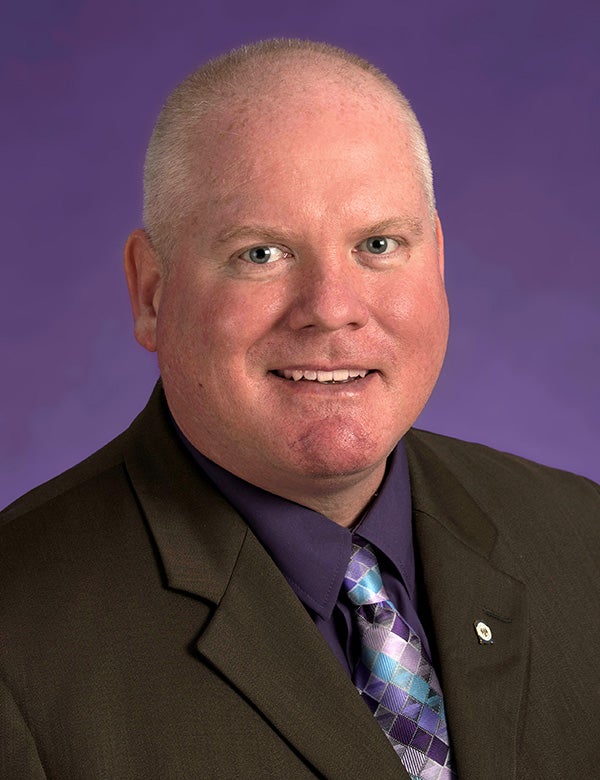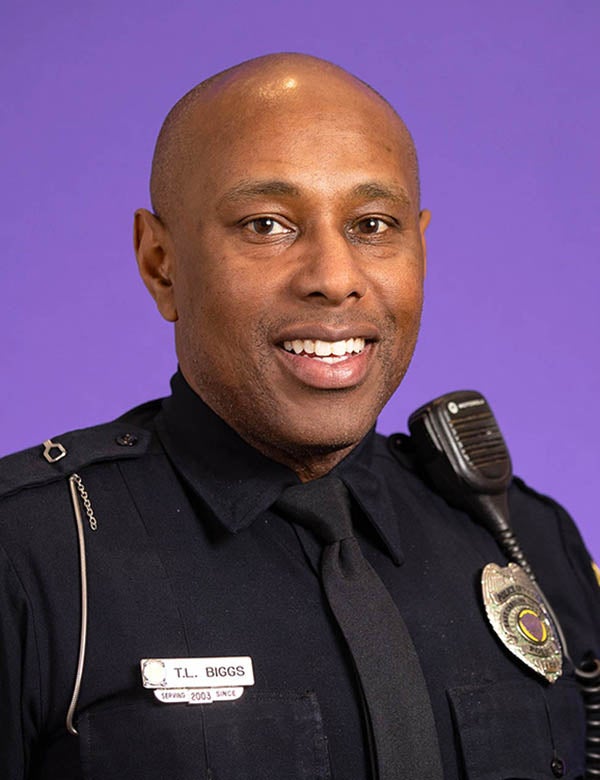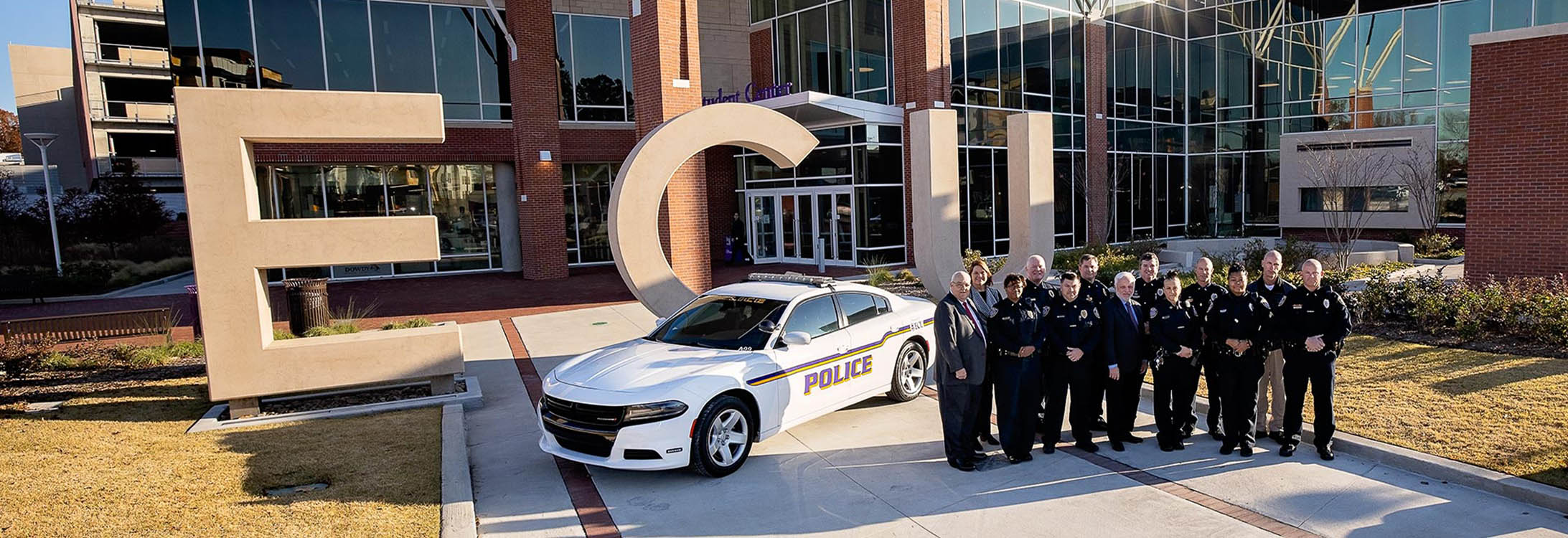FRANK CONVERSATIONS
ECU police engaging community on social justice, equality issues
The death of George Floyd at the hands of Minneapolis police officers sparked a movement for social justice this summer, a movement the East Carolina University Police Department supports.
“The message that comes across about social justice and equality is a message that we can all get behind,” ECU Police Chief Jon Barnwell said. “One of the things I want to do as a chief law enforcement officer is engage with our community and make sure that they understand through transparency what we are already doing and where we want to go and how we can help be a part of the foundation that helps this movement get where it needs to be.”
As students, faculty and staff return to campus for the fall semester, Barnwell and his department have taken steps to engage the community, step up training and examine policies in light of the social justice movement.
Barnwell points out that ECU is accredited as both a municipal and college police department, one of less than 100 dually accredited departments in the country. As such, the department is already adhering to the tenants of the 8 Can’t Wait campaign, policies that are designed to reduce police violence.

Jon Barnwell has served as chief of the ECU Police Department since December of 2017. He is increasing the department’s emotional intelligence training in light of the social justice movement.
“All of those eight topics, we already had those that are specifically addressed in our policy,” Barnwell said. “An example is to ban chokeholds. The only time a chokehold is allowed under accreditation standards is if deadly force is warranted. Outside of that scope, you’re not allowed to use any chokeholds. That was already incorporated in our policy.”
Barnwell said the department did decide to strengthen its policy on the duty to intervene. As in the death of George Floyd, Barnwell points out that three fellow officers stood by and took no action as Floyd pleaded that he couldn’t breathe.
“We at ECU wanted to specifically put teeth to that to let people know that regardless of rank or structure, you have an obligation to intervene when, regardless of who the aggressor is, they are utilizing unnecessary force,” Barnwell said, adding that disciplinary action for failing to intervene could include dismissal.
The department is also increasing its emotional intelligence training.
“The idea is that when we see unnecessary or excessive use of force, it’s typically after an individual has been emotionally hijacked, and so what’s more important to me is emotional intelligence, how you are able to handle your emotions and keep them in check,” Barnwell said.
He said supervisors have already gone through the training, and the goal is to have all of the department’s 60 officers go through the training, which is designed to help people recognize and manage their emotions. That can lead to an increased recognition and respect for the feelings of others, improved cooperation and better teamwork.
“Utilizing de-escalation techniques and stress management can make you arrive on the scene and not have that feeling of needing to be assertive and that ‘I’m the person in charge,’ but moreover to respond as the helper or the individual that can facilitate a positive outcome, whatever the situation may be,” Barnwell said. “Emotional intelligence is a core component in the law enforcement profession. Being able to utilize verbal judo to de-escalate a situation ultimately reduces not just the level of force but the need for use of force all together.”
The department works through the staff and faculty senates, the Student Government Association and its own Student Safety Committee to engage the campus community. Members have also been a part of two Cupola Conversations since Floyd’s death that addressed racism and equality.

ECU police officer Ted Biggs is working to engage the community in discussions about social justice and other issues.
Master Patrol Officer Ted Biggs is helping organize forums and Workout with a Cop sessions, with the goal of bringing people together for frank conversation and exercise. With the pandemic, he’s not sure yet what those sessions will look like, but he said engagement with the community is important.
“These can be difficult conversations, but sometimes you have to have those conversations to be better,” Biggs said. “We want people to get on board and openly ask questions and express concerns. The whole purpose is to get feedback.”
Biggs, who’s been with the ECU Police Department for 17 years, said that far more often than not, officers have a positive impact on students, and he doesn’t expect any issues as they return to campus in the fall.
“The majority of students like and respect what police officers do,” he said. “I don’t think there’ll be any hate. We will allow them to express themselves and that will be good. We have good relationships with them.”
Emily Michaud is the secretary of the Student Safety Committee, which serves as a liaison between the police department and students to maintain and increase safety on campus. The junior community and regional planning major believes the department has done a good job with social justice issues.
“ECU’s police department is always courteous and professional to everyone they encounter, no matter the circumstance,” she said. “The ECU PD is committed to maintaining a safe learning environment for all ECU students and treating all individuals with dignity and respect, regardless of their race, religion, ethnicity, etc. The department truly lives up to its core values of integrity, respect, professionalism and service.”
Students, staff and faculty are returning amid both the social justice movement and the coronavirus pandemic. Barnwell said response protocols implemented in March in which tele-reporting will be used for minor crimes will remain in the fall.
“Unless there is an actual crime in progress or there is a need to have a physical body at the location, we’ll try to handle as much as we can over the phone to keep folks safe,” Barnwell said.
